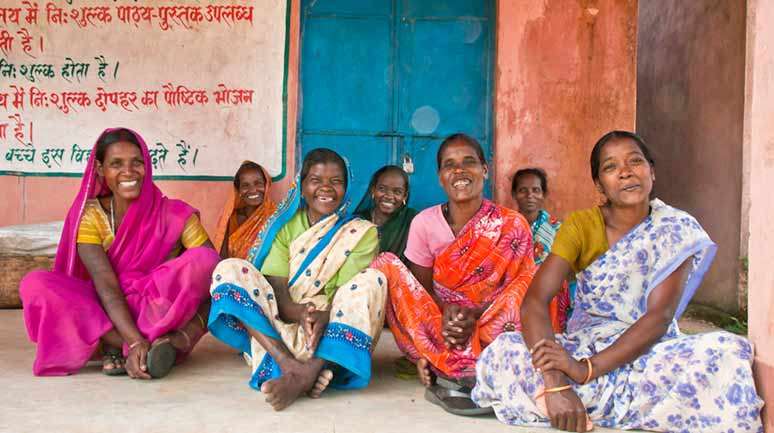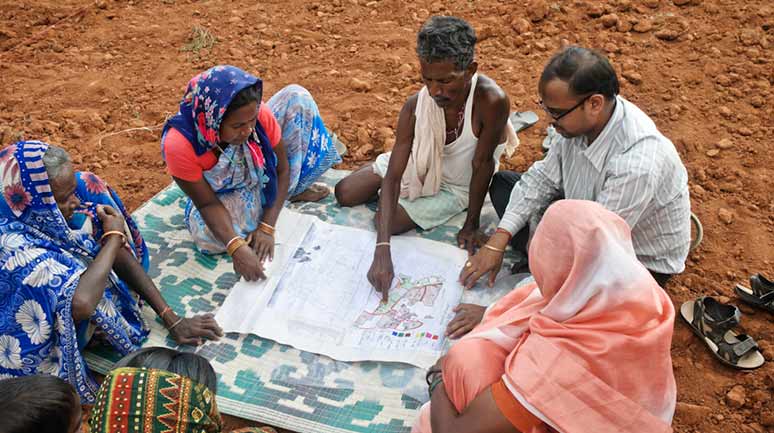DEVELOPMENT- Of the People and The Field


What comprises the core of development? To my mind, development happens when people begin to believe that they matter—that they have a right to lead a life of dignity and assert their rightful place in society.
Preamble
T he kind of person required for the development sector needs to be conceptualized in the context of development itself. My view is that people are at the centre of ‘development’. If one were to ask the question: “Development for whom?”, the answer would obviously be, “For the people.”
It stands to reason, then, that the centre of attention has to be the people. Their lives need to be touched and transformed - from a life of hopelessness to one of hope and faith in the future... from a life, the theme of which may be ‘I can’t’ to an unshakeable belief that, ‘I can’.
Development is about people and not projects
A t the heart of the matter is clarity about what comprises the core of development. To my mind, development happens when people begin to believe that they matter—that they have a right to lead A life of dignity and assert their rightful place in society.
Focussing on the development of individuals is an ‘expensive’ proposition. We need to be able to stimulate, nurture and sustain the sense of agency of groups and of collectives. Any change in society, in any case, even when inspired by an individual, has eventually to engage the hearts and minds of the masses.
This does not in any way imply that techno-economic approaches to development need to be ignored. I believe that the means need to be differentiated from the ends—the means being, predominantly, human and collective processes. People who wish to contribute to development need to have ample inner reserves of strength, courage and character to be in a position to extend a helping hand to somebody else in need.
People who wish to contribute to development need to have ample inner reserves of strength, courage and character to be in a position to extend a helping hand to somebody else in need
Empathic engagement—Touching people’s lives
T he medical field seems to have begun to recognize that the power of the human touch is critical for diagnosis as well as for the well-being of the patient being treated. This is so despite all the stupendous technological advances that have been made in the field of medicine.
In the field of development, empathic engagement with the ‘other’ is the key to sparking hope and change, which In the field of development, empathic engagement with the ‘other’ is the key to sparking hope and change, which may acquire a life of its own. Empathic engagement entails not only putting oneself in the other person’s shoes but also responding to the feelings and needs of the people - their feelings of hopelessness and hope, and their needs for succour, expression and freedom.
Young educated minds
A s Deep Joshi, in his post- Magsaysay award interview to NDTV, said, “The brightest of the brightest minds need to apply themselves to the most intractable problem that the nation is facing—that of poverty.”
I agree. Young educated minds with qualities of head and heart need to be brought into the fold to address the problems of endemic poverty. When nurtured in a culture of empathy, coupled with an education that sharpens their minds, people are likely to evolve into persons, who can identify problems and respond with an empathic heart.
These individuals will need to believe that they are the chosen ones—that they are meant for the purpose. Their orientation for the ‘job’ is, therefore, critical. And yes, nurturing and supporting them in their work in the field is equally essential.
Inner calling, reaching out and resonance
P eople who wish to contribute to development need to have ample inner reserves of strength, courage and character to be in a position to extend a helping hand to somebody else in need. Being able to integrate within, the disparities without will need an emotionally stable and grounded personality. Such a person will draw meaning in her or his existence, deriving joy from triggering transformation in others. The major motive may well need to be ‘extension’— reaching out to others and providing support.

Any profession is lifeless without the person being drawn to it by a sense of inner purpose and meaning - wherein she or he is able to visualize and experience the merger of their work with their being. The grooming provided to these youngsters needs to stimulate and reinforce this sense of purpose and meaning so that there is a rich resonance between what a person does and her or his being. Education begins in the dust so to say. Students and their teachers, along with the community, are committed to explore, study and come up with ideas that can address the real-life problems they encounter on a daily basis.
Education begins in the dust so to say. Students and their teachers, along with the community, are committed to explore, study and come up with ideas that can address the real-life problems they encounter on a daily basis.
Spirit of enquiry and exploration
T here are no ‘final’ answers to the issues of poverty and development. Anybody who is engaged with the issues of poverty will need to be in the field with a spirit of enquiry and exploration. Even when she or he may seem to have arrived at a ‘correct’ diagnosis or a feasible solution, the person’s willingness to put it to test against the ground reality and the community in context, will perhaps, eventually, decide the efficacy of any ‘diagnosis’ or intervention.
Freedom to think, to act and to be
And finally, Tagore comes to the rescue: Where the mind is without fear and the head is held high...
T o be able to value and understand the meaning of freedom, one needs to truly experience it in one’s own life. The young minds need to be nurtured to think without fear, see possibilities rather than constraints, develop the courage to say ‘No’, and be comfortable in their own skins—to know deep inside that they have made the most meaningful choice that they could have ever made in their lives.
A word or two about education programmes that could be designed and delivered to fulfil the areas of attention mentioned here.
I tend to think of a grass roots- up approach. By this, I mean, the grass roots is truly the ‘classroom’. Education begins in the dust so to say. Students and their teachers, along with the community, are committed to explore, study and come up with ideas that can address the real-life problems they encounter on a daily basis.
Relevant conceptual discussions help make sense of the phenomena observed and encountered. These discussions, or discourses, if one may choose to call them so, are needed to help discern patterns and develop systemic thinking, to evolve sustainable solutions.
As can be envisaged, a fair amount of work needs to happen on the process front—processes that equip a person with orientation and skills in group work to those that cultivate habits of empathy. The field needs to be the ‘live’ classroom, wherein these are nurtured, reinforced and developed. It is rather inefficient to help develop these in the usual classroom and then hope to transfer them to the field.
Regular deliberations about what is happening to the lives of the ‘students’, as they live and learn in such conditions, need to be an ongoing part of the system of education. A mentor, who is available on an ongoing basis, will help the process of grooming a student to envolve as a development professional. Ideally, no more than five students should be assigned to a mentor - a mentor who will be their friend, philosopher and guide.
Deepankar Roy is an organization development consultant associated with PRADAN for almost three decades and is based in New Delhi.

